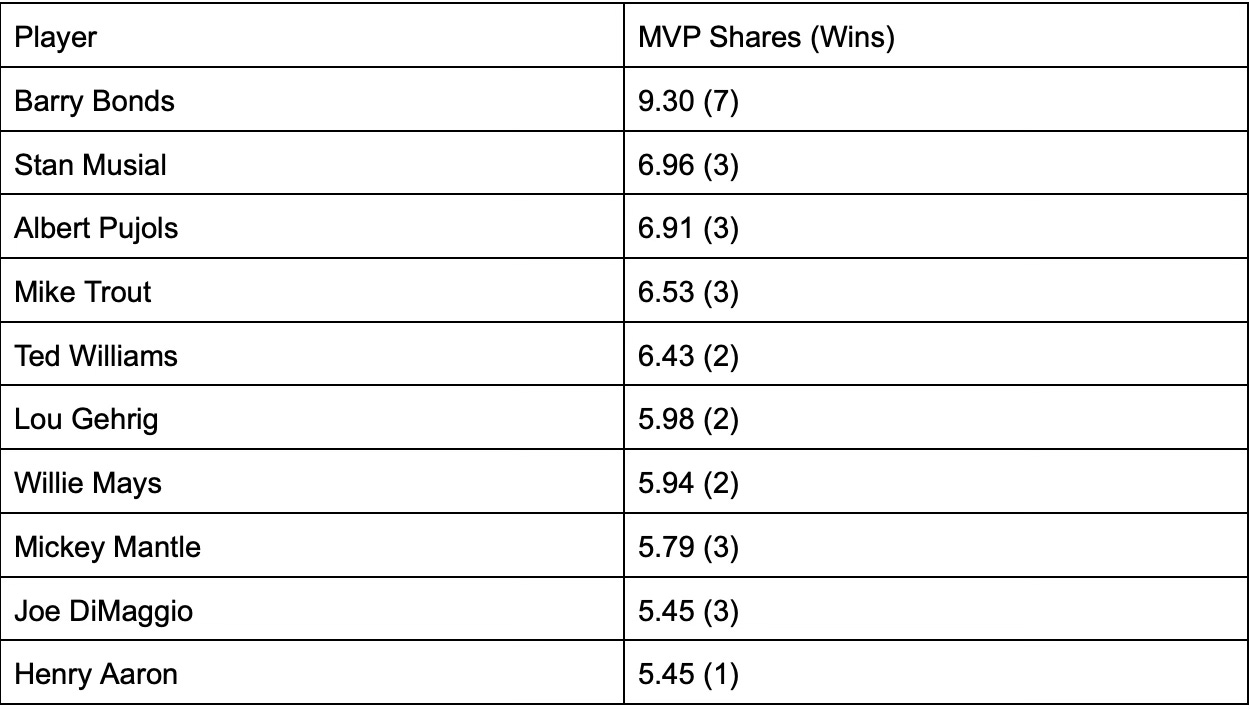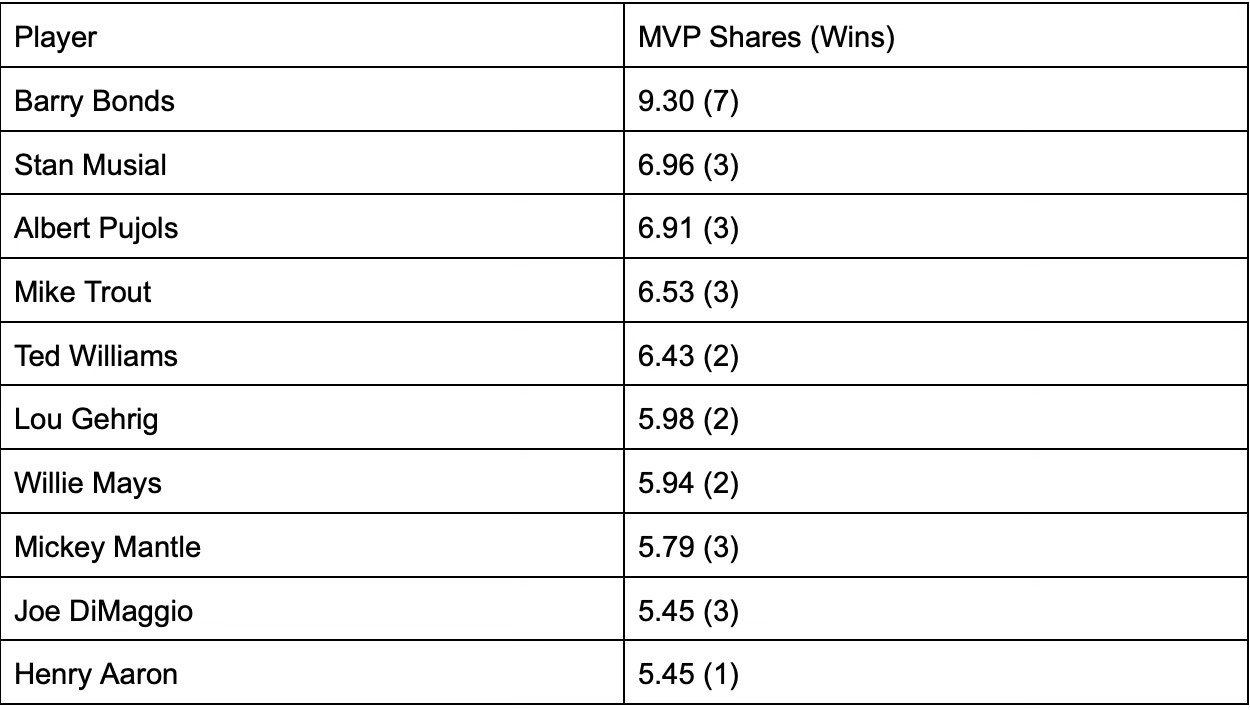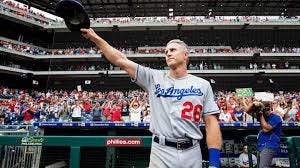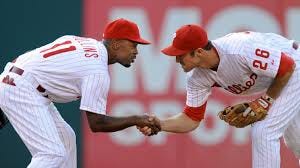When Chase Utley hit the ballot: I was hooked, he felt to me at the time a superb Hall of Fame candidate. I had my reasons: he ranks 12th all time in JAWS, a metric I generally use to gauge a player’s rough place in baseball history, and his peak score of 49.3 ranks 9th at second base. Even if the ranking was off a little: Utley felt like a strong candidate for the Hall of Fame. Today, I am less sure of myself. While I love WAR, and find it useful, I feel compelled to proceed more cautiously: I do not want one number to become too ubiquitous in our discussions. We should challenge what WAR tells us for the best analysis.
Was Chase Utley Ever Great?
One metric I am falling in love with is MVP Shares, a metric which gauges how much support a player has received in MVP voting. For context the top 10 in MVP Shares are some of the absolute all time best players ever:
OK, while I would not argue that this list is a perfect top 10 position players of all time (in fairness: the MVP began in 1931, so Ty Cobb and Babe Ruth predate the MVP), it’s darn close. Some other examples: Jose Ramirez (42nd) 3.08, Shohei Ohtani (24th) 3.67, and Kris Bryant (194th) 1.38. It’s an interesting way to measure how ‘great’ or ‘valuable’ a player was viewed in their time.
Chase Utley ranks 375th with 0.73 MVP Shares. That’s quite low, it’s below Nomar Garciaparra, it’s below Ken Singleton, it’s below Jorge Posada. No matter how you slice it: Chase Utley was not perceived to be that great of a player when he played. That isn’t to say he was unappreciated: he made 6 All-Star teams and won 4 Silver Sluggers. People recognized Utley’s presence on the field. But there’s a big difference between being appreciated and being a Hall of Famer.
So why does JAWS view Chase Utley as the 12th greatest second baseman of all time? This is ahead of every second baseman since Rod Carew (I might add). Well, it starts with offense: Chase Utley was a strong offensive player, particularly for a middle infielder. Chase Utley’s 117 OPS+ is about as good as Ryne Sandberg (114), Roberto Alomar (116) and Craig Biggio (112). He was not quite Jeff Kent (123), but he was not Nellie Fox (94) either. Second, Utley was a superb baserunner; he only stole 154 bases, and never finished in the top 10 in his league: but he was almost never caught. Utley was successful at nearly 90% of his attempts. So Utley added a bunch of value on the basepaths and with the bat. But this does not explain it all. Jeff Kent was a much better hitter than Utley, and he ranks 22nd in JAWS. The reason why Utley ranks 12th is that he ranks as among the absolute best second basemen of all time.
This is where I have questions.
The defensive portion of bWAR ranks Utley as the 11th strongest defensive player at the keystone in history. That’s ahead of multiple many time Gold Glove winners including Lou Whitaker, Roberto Alomar, Ryne Sandberg and Bobby Grich. He’s also ahead of ballot mates Ian Kinsler and Dustri Pedroia. What’s mind boggling about this is that Chase Utley was widely considered, by baseball people, to be a bad second baseman. Which means either defensive calculations on WAR are wrong, or that a lot of baseball minds got it wrong.
I tend to think Utley was at least a good defensive player. He led second basemen in putouts four times, assists twice, and range factor three times. So he clearly made more plays at second base, if nothing else. Furthermore, while the defensive metrics rank Utley as an all-time defensive player: they’re within the range of reasonable. The best ranked defensive second baseman of all time, Bill Mazeroski, ranks well ahead of Utley, while playing a comparable number of innings. Unlike Andruw Jones: the statistics suggest Utley was an underrated second baseman, not better than the best.
It’s also fair to point out there were detractors of the consensus when Utley played. Rob Neyer wrote a snarky article for ESPN predicting that Chase Utley will be on a Hall of Fame ballot some day: and the fact that he had not won a Gold Glove would be a problem. Furthermore Utley did not win any Gold Gloves: he did win a Fielding Bible Award in 2010. So while our traditional metric for defensive excellence (Gold Gloves) missed for Utley: it’s not like the only data rests on advanced metrics. The general consensus among analysts is that while Utley lacked the flashy physical traits of excellent fielders: his positioning made up for it.
Which, if we believe Utley was a good to great defensive second basemen, then yes: from 2005 to 2010 Utley was a great player. He excelled in all three parts of the game: hitting nearly .300 with some good power, playing Gold Glove (or near Gold Glove) caliber defense, and aggressively taking bases, while almost never getting caught.
Did Chase Utley Have Staying Power
Utley certainly played for a long time, taking at bats until he almost turned 40. After he left Philadelphia he became a strong part time player for the Dodgers, where he assisted LA in winning three division titles well past his prime. He also made an All-Star team at 35 after his bat speed declined. Overall Utley’s problem was not his ability to play beyond his prime, it was staying on the field at all.
Utley debuted late for a Hall of Famer at 24, became a regular at 26, and retired at 39. Overall his 16 seasons is low for a Hall of Fame player, as are his counting stats of 1,885 Hits, 259 Homers and 154 steals. But the reason why his counting stats are low is because he rarely played full seasons; for his career he only played in 130 games or more 8 times. In contrast, contemporary Jeff Kent (who played 17 seasons) played 130 games or more 11 times, and Roberto Alomar (also 17 seasons) had 13 such seasons. Resulting in Kent & Alomar receiving far more playing time. Here are their counting statistics:
Looking at these three careers through a volume perspective, Utley comes up well short. However, if we look at rate statistics: Utley compares more favorably.
As we knew going in: Jeff Kent is still the best hitter of the bunch, but Chase Utley and Roberto Alomar were similar hitters, with Utley making up for some walks by hitting for more power. Personally, we must factor in Utley’s health when evaluating his case. Staying on the field is a skill: if the Phillies weren’t playing Utley, they were probably subbing in a lesser player and that matters, but it’s not everything.
Is Chase Utley an Inalienable Part of Baseball History?
He’s a big part of it, undoubtedly. Utley’s Phillies were a dominant force in the NL East during his career, and the 2008 Phillies World Series was the second in franchise history, and the first since 1980 (a notable drought). Utley, by WAR, was the best player of the bunch: better than Ryan Howard and Jimmy Rollins both years they won the MVP. Utley did hit a big home run in that World Series, which is remembered by many Phillies fans in 2008, and another one in 2009 which tied Reggie Jackson’s record for most home runs in the postseason. You cannot tell the story of the late 2000s, and early 2010s, Phillies without discussing Chase Utley.
That being said, I think Jimmy Rollins and Ryan Howard were more beloved at the time: there’s a reason why they won MVPs, while Utley did not. Cliff Lee showed up in 2009 and took some of the spotlight, and finally Roy Halladay in 2010. So while Utley is a big part of this group: he is not the defining player of the group either.
Granted I think the statistics show that Utley was underappreciated. He was a huge part of their winning culture, likely more valuable than Ryan Howard for sure (especially after he signed that awful extension), and arguably more than Jimmy Rollins (who we’ll get to later). I think Chase Utley should be remembered as the superstar who helped the Phillies briefly reign as kings of baseball.
Conclusion
How you feel about Chase Utley entering the Hall of Fame really falls down to how you measure his defense. If you view Utley as one of the all time best defensive second baseman, as good or better than Bobby Grich and a few others: then he’s a resounding Hall of Famer. If you think Utley was a good to great defensive second baseman (probably where I sit): then he’s a Hall of Famer, similar to Craig Biggio and Roberto Alomar or a touch short of them. If you think Utley was an underrated, but mediocre second baseman: then he’s a fringe Hall of Famer at best. If you view him as a defensive liability, as many did at the time: he’s not even in the conversation.
I struggle to believe that Utley was a bad or mediocre defensive second baseman. When you lead the league in putouts and assists, and frequently rank in the top 10 in the league: you have to at least be competent out there. I do not doubt that modern defensive metrics may overrate modern players, but for me the question isn’t whether I view Utley as good as Grich or Mazeroski: it’s whether he’s good enough to get into the Hall of Fame. Even with some amount of uncertainty: I think Utley crosses that line. Whether he ranks 12th or 17th is a question for another day.
Which does bring me to some frustrations. I think Utley belongs, but I feel other second basemen who were not considered for the Hall of Fame, also belong. Do I believe that Chase Utley is really a better Hall of Fame candidate than Bobby Grich? No. Lou Whitaker? Maybe, but it’s close. There are other players waiting in line who, ideally in my view, would have gotten there do: and that leaves a sour taste in my mouth. I feel similarly about Andruw Jones. I am comfortable with Jones in the Hall, but the fact that Jim Edmonds, Kenny Lofton and Jim Wynn (among other great center fielders) were barely considered leaves a sour taste in my mouth. The BBWAA cannot correct those wrongs however, all we can do is face the ballot in front of us, and Utley should not suffer for the failures of past voters.
-Benjamin, J








